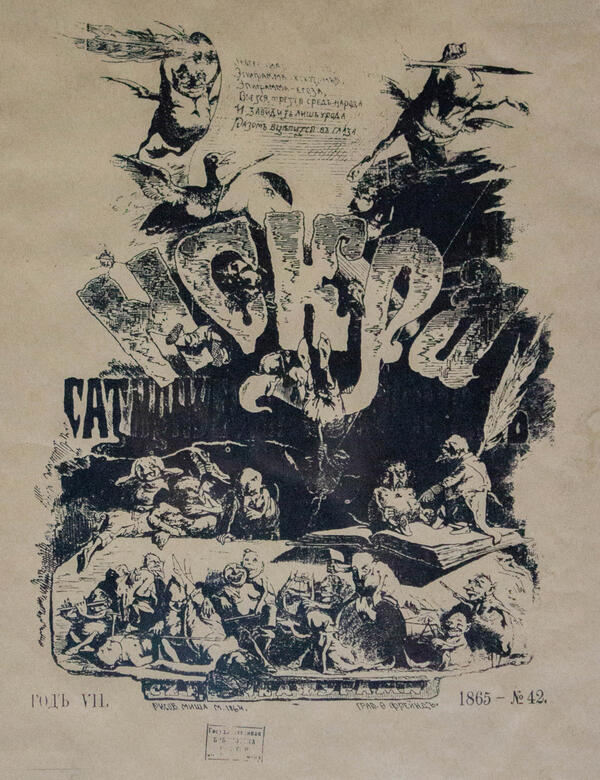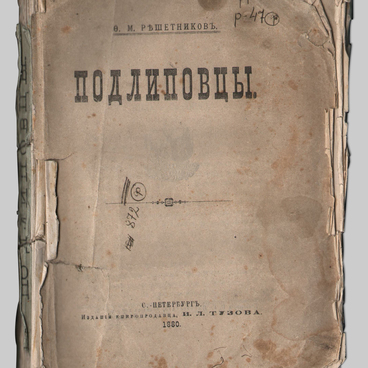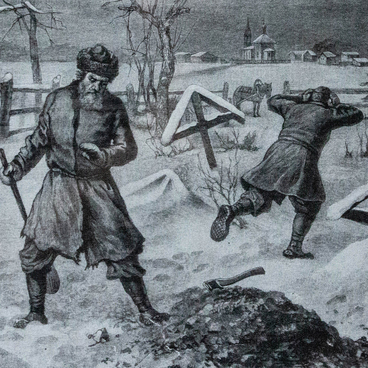The Saint Petersburg hall displays a fragment of the Iskra magazine, a weekly satirical periodical that was published in Saint Petersburg from 1859 to 1873. The magazine was founded by poet VasIly Kurochkin and cartoonist Nikolay Stepanov. Iskra’s articles, literary feuilletons, satirical poems, and caricatures ridiculed and exposed bribery, censorship oppression and autocratic bureaucratic arbitrariness. A prominent role in the magazine was played by the Letters to the Editor section, which covered letters from provincial readership. It was so successful in its denunciation functions that the officials were afraid to become the characters of another material. Censorship kept an eye on the Letters to the Editor section. It was forbidden to give the names of major officials and the cities where injustice was taking place, and the magazine had to opt for allegorical language.
Iskra was a relatively cheap periodical: in St. Petersburg, the issue cost six rubles and in the province, seven and a half. The role of Iskra, according to Maxim Gorky, was huge: “Herzen”s Kolokol was a magazine before which the upper strata of society in the capitals trembled, while Iskra was distributed in the lower strata and in the province, it was more accessible to both the mind and the pocket of the most valuable readers of that time - the young students…”
Such prominent writers as Alexey Tolstoy, Nikolay Dobrolyubov, Nikolay Nekrasov worked with the magazine. The Urals writer Fyodor Reshetnikov, who lived in St. Petersburg in the 1860s, was also published in Iskra. The magazine published his essays and stories of the newspaper type: “Fair in the Jewish City”, “Women of the Nikolsky Market”, “In Search of Earnings”, and “Vnuchkin”. Reshetnikov was not much satisfied working with the magazine, as he wrote in his diary: “I find that all our editors, publishers and booksellers are rascals <…> Kurochkin should have paid the staff properly. However, the situation is similar to what Usov did to me. He says that there is no money — that”s all. The fact that Kurochkin could have paid the employees properly is proved by the fact that he lives on Nevsky, has a good apartment… His visiting hours are only on Sundays from 12 o”clock. He goes to the theaters… It has been a year and Kurochkin could not even remember my name and patronymic…”
Iskra was a relatively cheap periodical: in St. Petersburg, the issue cost six rubles and in the province, seven and a half. The role of Iskra, according to Maxim Gorky, was huge: “Herzen”s Kolokol was a magazine before which the upper strata of society in the capitals trembled, while Iskra was distributed in the lower strata and in the province, it was more accessible to both the mind and the pocket of the most valuable readers of that time - the young students…”
Such prominent writers as Alexey Tolstoy, Nikolay Dobrolyubov, Nikolay Nekrasov worked with the magazine. The Urals writer Fyodor Reshetnikov, who lived in St. Petersburg in the 1860s, was also published in Iskra. The magazine published his essays and stories of the newspaper type: “Fair in the Jewish City”, “Women of the Nikolsky Market”, “In Search of Earnings”, and “Vnuchkin”. Reshetnikov was not much satisfied working with the magazine, as he wrote in his diary: “I find that all our editors, publishers and booksellers are rascals <…> Kurochkin should have paid the staff properly. However, the situation is similar to what Usov did to me. He says that there is no money — that”s all. The fact that Kurochkin could have paid the employees properly is proved by the fact that he lives on Nevsky, has a good apartment… His visiting hours are only on Sundays from 12 o”clock. He goes to the theaters… It has been a year and Kurochkin could not even remember my name and patronymic…”



